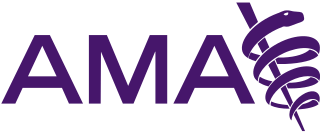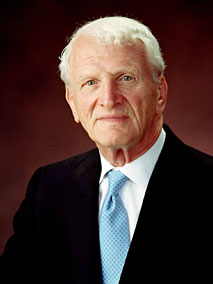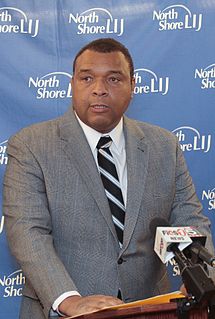
The American Medical Association (AMA), founded in 1847 and incorporated in 1897, is the largest association of physicians—both MDs and DOs—and medical students in the United States.

Edward Donnall "Don" Thomas was an American physician, professor emeritus at the University of Washington, and director emeritus of the clinical research division at the Fred Hutchinson Cancer Research Center. In 1990 he shared the Nobel Prize in Physiology or Medicine with Joseph E. Murray for the development of cell and organ transplantation. Thomas and his wife and research partner Dottie Thomas developed bone marrow transplantation as a treatment for leukemia.
JAMA Otolaryngology—Head & Neck Surgery is a monthly peer-reviewed medical journal published by the American Medical Association covering all aspects of prevention, diagnosis, and treatment of diseases of the head, neck, ear, nose, and throat. The editor-in-chief Jay F. Piccirillo. It was previously published under the title Archives of Otolaryngology–Head & Neck Surgery, and established in 1925 under the title Archives of Otolaryngology.
The American Society of Anesthesiologists (ASA) is an educational, research and scientific association of physicians organized to raise the standards of the medical practice of anesthesiology and to improve patient care.
The Endocrine Society is a professional, international medical organization in the field of endocrinology and metabolism, founded in 1916 as The Association for the Study of Internal Secretions. The official name of the organization was changed to the Endocrine Society on January 1, 1952. It is a leading organization in the field and publishes four leading journals. It has more than 17,000 members from over 120 countries in medicine, molecular and cellular biology, biochemistry, physiology, genetics, immunology, education, industry, and allied health. The Society's mission is: "to advance excellence in endocrinology and promote its essential and integrative role in scientific discovery, medical practice, and human health."
Laryngology is a branch of medicine that deals with disorders, diseases and injuries of the vocal apparatus, especially the larynx. Common conditions addressed by laryngologists include vocal fold nodules and cysts, laryngeal cancer, spasmodic dysphonia, laryngopharyngeal reflux, papillomas, and voice misuse/abuse/overuse syndromes.
The American Academy of Ophthalmology (Academy) is a professional medical association of ophthalmologists. It is headquartered in San Francisco, California. Its membership of 32,000 medical doctors includes more than 90 percent of practicing ophthalmologists in the United States as well as over 7,000 members abroad.

The American Board of Otolaryngology, located in Houston, Texas, is a non-profit corporation that has set the mission of ensuring professional standards with certificates and memberships, and have offered training in the fields of head neck surgery to professionals since 1924.

The American Academy of Otolaryngology–Head and Neck Surgery (AAO-HNS) is one of the largest of the world's many professional associations for medical specialists, with nearly 12,000 specialists in the area of otolaryngology (otorhinolaryngology) - caring for the ears, nose, and throat and surgery of the head and neck. The medical disorders treated by these physicians are among the most common that afflict all Americans, young and old. They include chronic ear infection, sinusitis, snoring and sleep apnea, hearing loss, allergies and hay fever, swallowing disorders, nosebleeds, hoarseness, dizziness, and head and neck cancer.
The Organization of Medical Anthropology was formed in 1967 and first met on April 27, 1968, at the 27th Annual Meeting of the Society for Applied Anthropology (SfAA), during which the Medical Anthropology Newsletter was conceived and first published in October 1968 with 53 subscribers. On November 22, 1968, the Organization held its first medical anthropology workshop at the American Anthropological Association (AAA) Annual Meeting and became the Group for Medical Anthropology (GMA). Thereafter, medical anthropology meetings have met regularly both at the SfAA and AAA meetings. At the AAA Annual Meeting in San Diego, California, in November 1970, the GMA became the Society for Medical Anthropology (SMA) and adopted its Constitution, of which its first objective was “to promote study of anthropological aspects of health, illness, health care, and related topics.” In 1971, the SMA became a section of the AAA.
Robert Harold Miller is an American surgeon and the executive director of the American Board of Otolaryngology in Houston, Texas, U.S.A.

Patrick Gullane, CM, OOnt, MB, FRCSC, FACS, FRACS (Hon), FRCS (Hon), FRCSI (Hon) is a Professor in the Department of Otolaryngology-Head and Neck Surgery, and a Professor of Surgery, Faculty of Medicine at the University of Toronto.

The Australian Society of Anaesthetists is an association that seeks to further the best interests of anaesthesia and anaesthetists.
The American Osteopathic Boards of Ophthalmology and Otolaryngology - Head and Neck Surgery (AOBOO) is a joint organization that provides board certification to qualified Doctors of Osteopathic Medicine (D.O.) who specialize in the medical and surgical treatment of the eye (ophthalmologists) and to qualified Doctors of Osteopathic Medicine who specialize in the medical and surgical treatment of the ears, nose, and throat (otolaryngologists). The boards belong to the 18 medical specialty certifying boards approved by the American Osteopathic Association Bureau of Osteopathic Specialists of the American Osteopathic Association. As of December 2011, 736 osteopathic ophthalmologists and otolaryngologists held active certification with the AOBOO.

Eugene Nicholas Myers is an oncologist and otolaryngologist and a leader in the treatment of head and neck cancer. He has served on the faculty of the University of Pittsburgh School of Medicine since 1972, when he became chairman of the Department of Otolaryngology. He is the author or co-author of leading texts in the field of head and neck cancer, and has chaired and served on the boards of the preeminent societies and associations in the field.
Jonathan E. Aviv is an American otolaryngologist–head and neck surgeon and a professor of Otolaryngology–Head and Neck Surgery at Icahn School of Medicine at Mount Sinai Hospital in New York City, New York. He is also Clinical Director of the Voice and Swallowing Center at ENT and Allergy Associates in New York City, New York. An inventor, author, educator, physician and surgeon, he is best known for his invention of Flexible Endoscopic Evaluation of Swallowing with Sensory Testing (FEESST), a medical device that allows office-based assessment of oropharyngeal dysphagia, or swallowing disorders, without the use of X-ray. He is also known for his development of Transnasal Esophagoscopy (TNE), a method of examining the esophagus without using conscious or intravenous sedation. From 1991 to 2009, he was a full-time academic surgeon and director of the division of head and neck surgery at Columbia University College of Physicians and Surgeons.

William R. "Doc" Spencer is a legislator and physician in Suffolk County, New York. He currently serves as the Legislator for the 18th Legislative District, which comprises the communities Asharoken, Cold Spring Harbor, Centerport, Eaton's Neck, Greenlawn, Halesite, Huntington Bay, Huntington, Lloyd Harbor, and Northport. Additionally, the district includes portions of Huntington Station and East Northport.

The Boston Society for Medical Improvement was an elite society of Boston physicians, established in 1828 for "the cultivation of confidence and good feeling between members of the profession; the eliciting and imparting of information upon the different branches of medical science; and the establishment of a Museum and Library of Pathological Anatomy". It held regular meetings until at least 1917.
Sidney Yankauer (1872–1932) was an American otolaryngologist. Working at Mount Sinai Hospital in New York City, Yankauer was among the first surgeons to specialize in problems of the ear, nose and throat. A common medical suction device, the Yankauer suction tip, is named for him.
Lakhumal Hiranand Hiranandani (1917–2013) was an Indian otorhinolaryngologist, social activist and philanthropist, known for pioneering several surgical procedures which later came to be known as Dr. Hiranandani's Operations. He was the founder chairman of Hiranandani Foundation Trust which runs two schools in India and was reported to have been active in the social movement against organ trade in India. He was a recipient of the Golden Award of the American Academy of Otolaryngology–Head and Neck Surgery, the first Indian and the fifth overall to receive the honour. The Government of India awarded him the third highest civilian honour of the Padma Bhushan, in 1972, for his contributions to medicine and society.











